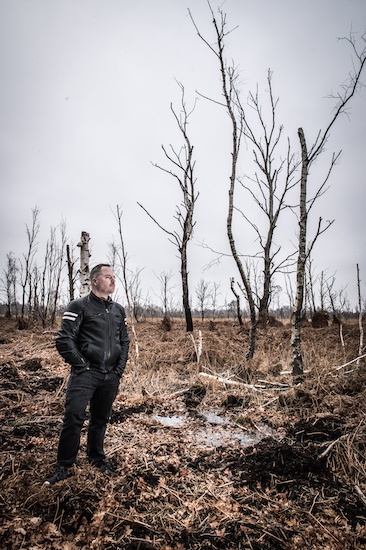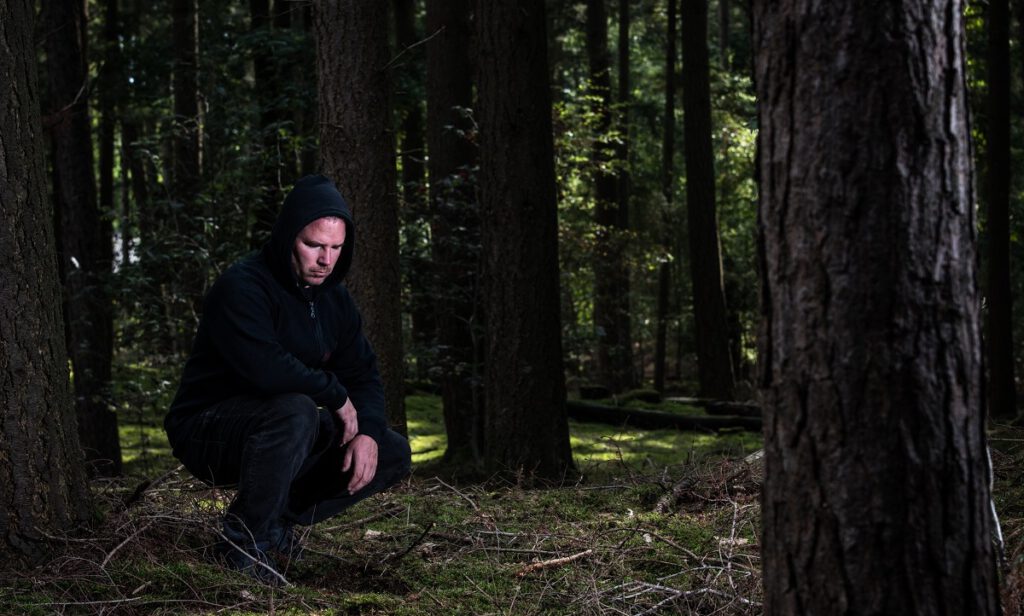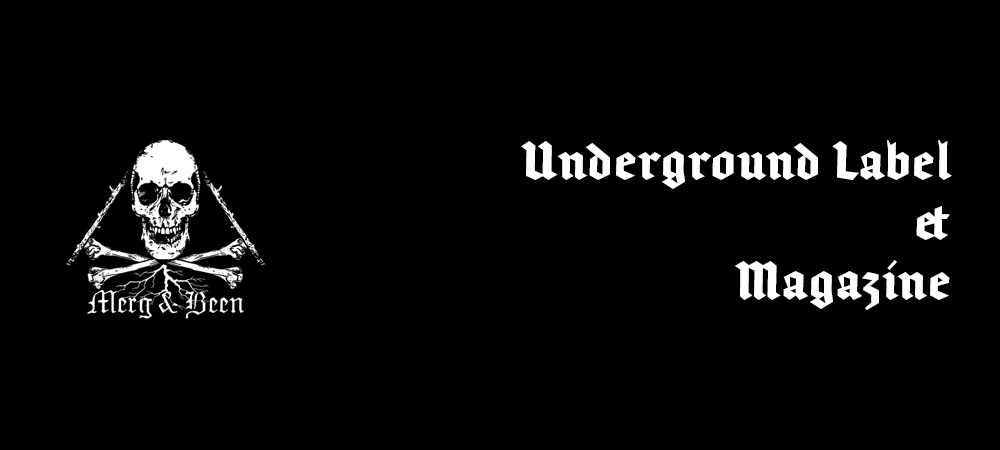
Today marks the release of “Verstrikt in Halflicht”, the new album by the Dutch band Schavot. A perfect opportunity to sit down with Floris Velthuis and ask him about Schavot and all his other ventures.
Schavot is your personal vision of Black Metal. How has this project evolved since its inception, and how does it differ from other musical ventures you have been involved in?
I’m involved in several active bands and projects, each with its own history and dynamics. Some of these projects have a completely different sound, while others, like Schavot and Asgrauw, draw from the same source of inspiration but have distinct vibes due to different main composers. Asgrauw is also the only active live band among them.
Schavot is actually an idea that has been in my mind for a long time. I like a specific style of melodic, atmospheric 2nd wave black metal, particularly the Scandinavian bands. I wanted to create this style and add a Dutch twist to it. I found the necessary time and peace during the pandemic. Galgenbrok (2021) and Kronieken uit de Nevel (2023) are fairly closely related. It’s fast, cold black metal with melody. On the 4-way split Verloren Vertellingen (2023), the compositions became a bit more complex, more story-telling and symphonic, with keyboards taking a more prominent role. I further explored this style on the new album Verstrikt in Halflicht (2025).
Dutch nature and history play a significant role in your music. Is this primarily an aesthetic choice, or is there a deeper spiritual or philosophical connection behind it?
In the medieval town of Ootmarsum, where I grew up, nature was deeply intertwined with old folklore and local traditions. This has always fascinated me. Every region has its own history, and I find ancient landscapes and nature captivating – what have those old trees witnessed? Now, I live in the province of Limburg, where that same connection to nature and history endures. People sometimes forget that we are simply mammals with clothes on… that we should reconnect with nature, for we cannot live without it – both spiritually and physically. History is also crucial to understanding who we are and where we come from. Folk tales reveal much about ourselves, our ancestors, and our fears. Moreover, sometimes we must look back to recognize the mistakes we must never repeat. Personally, I often feel the need to be in nature to clear my mind; it helps me de-stress. I enjoy sitting by the water, and I also have the hobby of aligning my life’s path with ancient bonsai trees in my garden, hoping they outlive me. That might seem like a contrast to black metal, but to me, both are forms of meditation and expression.
Schavot fits within a long tradition of Black Metal but also has its own distinct identity. How do you balance honoring the foundations of the genre while carving out your own voice?
I don’t see any friction between honoring the foundations and having my own voice – they can coexist perfectly. When it comes to black metal, the foundations are actually all I’m familiar with. Born in 1980, I first encountered black metal in the mid-nineties and I developed a very specific taste. I was particularly drawn to the atmospheric, melodic bands that told stories through their music. I also developed an interest in the more experimental black metal of the 90s. After the millennium, my interest in black metal faded somewhat, though I still enjoy following the Dutch and Flemish scene. I’ve remained attached to the classics, and that’s why it’s only natural that my music sounds like it does: I simple have no other references. But I didn’t grow up between the icy Norwegian fjords; I was raised in a rural Dutch village, surrounded by farms, Witte Wieven, ancient oak trees, and midwinterhorns. That’s why Schavot sounds the way it does.

Dutch Black Metal has seen a remarkable rise, with both orthodox and experimental projects. How do you see Schavot’s role within this growing movement? Do you feel a connection with other Dutch acts, or do you view yourself as separate from a specific scene?
It’s truly great to see that the Dutch (and Flemish) scene has recently experienced tremendous growth, with high quality black metal that can compete with big international names. Whether Schavot is of significance within this, I’ll let others judge. I don’t concern myself with that. I do feel a connection with other Dutch acts, and I share warm ties with several musicians and music fans. I understand their passion and drive, and I enjoy exchanging thoughts or listening to other musician’s demos. We have our own small collective of like-minded music friends – the Zwotte Kring. We collaborate, support one another, and assist each other with everything that comes with making music.
As a one-man band, you are entirely responsible for production, instrumentation, and lyrics. In which aspect of the creative process do you feel the most artistic freedom, and where do you experience the greatest challenge?
I feel that artistic freedom is present in every aspect – from the first note to the final touches in the mix. Fortunately, I have friends around me who listen and offer critical feedback, because after weeks of recording and mixing, it’s easy to fall into tunnel vision. I’m naturally a DIY person and struggle with outsourcing or letting go creatively. However, for the new album, I brought in several guest musicians (including Gerhans from The Color of Rain / Meslamtaea) and a second lyricist, Daan from Hellevaerder, Magistraal and Duindwaler, who also contributed guest vocals. Also the stem-mastering was outsourced to Devi Hisgen, to give the music the full and warm sound it needed. These are people from our Zwotte Kring collective, with whom I share a strong musical connection.
One challenge I face is being quite old-fashioned and particular about my taste, while certain creative choices aren’t always understood by today’s audience. I’d rather not adjust. Anthems to the Welkin at Dusk by Emperor is the perfect example of a production I admire – an album full of layers, details, and ideas that reveal something new each time you listen. Even after all those years, I still hear things I hadn’t noticed before. Those classics we played constantly – and still do – remain endlessly fascinating. But today’s music is fleeting, with interest lasting only a few days before a new hype emerges. Many modern productions are therefore clear, loud, and in-your-face, leaving no room for depth or discovery. I try to make my music like that I admire, though, with hidden details waiting to be discovered by those who listen closely.
How does your creative process unfold? Do you start with a specific idea or atmosphere you want to create, or do you let things develop organically? Are there any rituals or fixed methods you use when writing and recording?
It varies depending on the moment. Sometimes riffs just come to me naturally, other times I simply jam until something useful emerges. Occasionally, I can force ideas, sometimes there’s a time when nothing comes at all. While writing Verstrikt in Halflicht, I hit walls with my guitar playing. As a result, I wrote a few songs purely from keyboards, adding drums and guitars later. These turned out to be the most symphonic and epic tracks on the album, and I was really pleased with how they came out. When I have a set of ideas that fit together, I start piecing and puzzling them together until I have an arrangement that tells a story and provides enough musical contrast. The rest just follows naturally. I love mood swings in my music, from aggression to calmness and melancholy. To come up with lyrics, I love diving into inspiring books with old folk tales or looking up classic paintings by the old masters.

The melancholic, almost nostalgic atmosphere in your music evokes a sense of transience. To what extent does time (the past versus the present) play a role in Schavot’s themes?
You hit the nail on the head there! Much of the music I write is based on rejecting the present or escaping from it. Schavot feels like a form of escapism for me and nostalgia plays a huge role in that. By that, I don’t only mean that the lyrics are about the past. I also mean that I personally enjoy going back to my own childhood and the sense of wonder I experienced as a child. As a kid, I loved watching the BBC seriesRobin of Sherwood (1984–1986). It made an indelible impression on me. Even now, I recall those images in my head when writing Schavot – life in the forests, castles, mysterious natural phenomena, and witchcraft. Now that I’m an adult, I try, perhaps in vain, to still evoke that feeling. In today’s fast-paced world, it becomes increasingly difficult. But it appeals to me more than watching the News right now.
Schavot has a clear artistic vision. Where do you ultimately want to take this project? Is there a specific goal you hope to achieve, or is the journey itself the most important part?
I don’t make future plans or set specific goals for Schavot or any of my other projects. I embrace the past and focus on the present, allowing everything to unfold naturally as it comes.
Thanks for the interview!
Schavot:
Instagram
Facebook
Bandcamp (Void Wanderer Productions)

